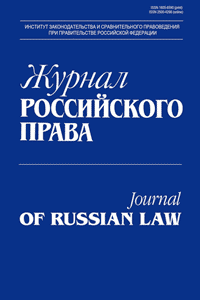Russian Federation
Along with the concepts of the legal systems of individual states (“country systems”) and of the legal families (“country groups” of individual similar legal systems), the author employed the methods of comparative law such as induction, content analysisto offer a broader socio-legal basis of division and to highlight three global (world) legal systems in the modern world: Muslim, liberal semi-social capitalist and totalitarian-socialist. The concept of a global legal system and a legal family (some of these families, such as the Anglo-Saxon and Roman-German, too, are global in nature), but the latter are dealt with in the framework of global legal systems (rather than separately). Such classifications are scientific concepts based on similarities and differences between the actual legal phenomena. Concepts and classifications based on global legal systems constitute their essence (formation), and identification of family-legal content of civilizational and socio-cultural nature allows a researcher to establish some new families. The author identifies the essential features of each of the three global legal systems, and such features underlie their fundamental differences, thepossibilities and limits of convergence of the global legal systems. Such limits are conditioned by varying social essence pertaining to such global systems as well astheir antagonism which makes convergence processes often superfluous rather than substantive in nature. This article discusses different legal families within various global legal systems. It states that harmonization of similar-typesocial processes is possible while it is impossible between different-type legal families.
Legal system of a state, legal family, global legal system, formational essence, civilizational socio-cultural content, a new classification of legal systems and families.
1. David R. Les grands systèmes de droit contemporains. R., 1964.
2. Gicquel J., Gicquel J.-É. Droit constitutionnel et institutions politiques. 22-éd. P., 2007.
3. Lutz A. Typologies of Modern Legal Systems of the World. Journal of Comparative Law. Vol. V. Iss. 1. 2012.
4. The Oxford Handbook of Comparative Law / eds. by M. Reimann, R. Zimmermann. Oxford, 2008.
5. Kuzyk B. N., Yakovets Yu. V. Tsivilizatsii: teoriya, istoriya, dialog, budushchee: v 6 t. T. III:
6. Severnoe Prichernomor´e - prostranstvo vzaimodeystviya tsivilizatsiy. M., 2008.
7. Lukasheva E. A. Chelovek, pravo, tsivilizatsii: normativno-tsennostnoe izmerenie. M., 2009.
8. Supataev M. A. K problematike tsivilizatsionnogo podkhoda k pravu (ocherki obshchey teorii i praktiki): monografiya. M., 2012.
9. Toynbi A. Postizhenie istorii. M., 1991.








